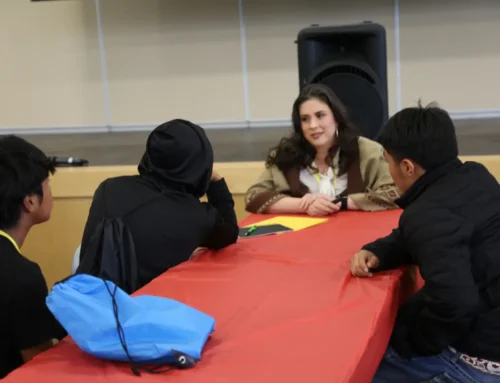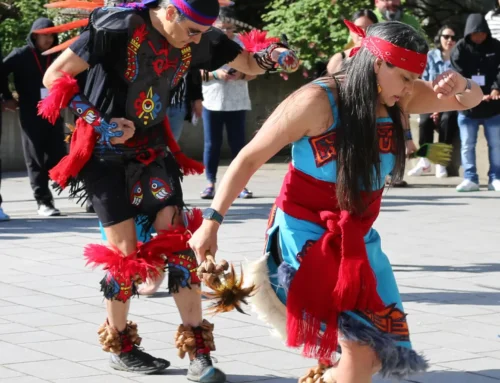Everyone is doing their best to serve all students during the Long-Term School Closure (LTSC). State and local guidance is updated daily and sometimes hourly. It is difficult to keep up. In April OSPI released Migrant Education Program (MEP) Guidance During LTSC on considerations to best support Students under Title 1, Part C. District teams are asked to consider a student’s readiness to learn outside of the school facility based on a deep understanding of Maslow’s Hierarchy of Basic Human Needs which outlines the needed safety and well-being supports required before “academics” can begin (See page 9 MEP Guidance).
At the NWESD, we know that school districts and educators are busy, and we are here to provide a support system! Governor Inslee’s March 23rd Stay Home, Stay Healthy Order and Extended Proclamation through May 31st deems Food and Agriculture Sector workers as essential. As many of the farm workers in our region continue to work, there is a need for additional resources and supports for our families. Our farm workers face compounding barriers during the COVID-19 pandemic and every family has their own unique reality. Some of these barriers may include, but are not limited to: access to food/nutrition programs, lack of health insurance, inability to pay fees, ineligibility for cash assistance programs, trauma from insecurities in the home, mobility and early movement due to harvest seasons, feelings of isolation due to immigration sentiments and policies.
The level of adult support available in the home will vary, like with every other family, educators are tasked with understanding the unique needs of each migrant student as they do outreach. Every family is different, and the COVID-19 resources are not easy to understand. Addressing the potential barriers may come from a variety of resources, outreach, and contacts. Educators may wish to expand their knowledge of how to respond to an identified barrier by participating in professional learning created specifically to address the academic and support needs of migratory children. Training is offered through partnerships with your very own Educational Service District.
The NWESD’s Migrant Education Team is here to respond with needed Professional Development, they have been busy centralizing Emergency Resources for Migrant Families and supporting educators and families in navigating all of this information. This resource list is yours to explore as you look to best meet the needs of Migrant students. Your ESD Coordinators are also here to answer any questions you may have.
We have highlighted especially helpful information from the resource list in the tabs below. We are here to help you understand and navigate this information as you reach out to Migrant families in your district. And supporting educators and families in navigating all of this information. This resource list is yours to explore as you look to best meet the needs of Migrant students. Your NWESD Coordinators are also here to answer any questions you may have. We have highlighted especially helpful information from the resource list in the tabs below.
Opportunity: Each day, choose one resource that you would like to learn more about.
Challenge: Every day, choose one resource that you think a colleague would find helpful and share it to spread awareness.
Spanish Language Resources
The Migrant Education Skagit Health Nurse provides COVID-19 prevention guidance to families, as well as COVID-19 testing site information at Skagit Valley College.
Skagit County Public Health COVID-19 Videos
The Skagit Health Department has compiled a series of videos that responds to questions regarding COVID-19 in Spanish.
COVID-19 Guia de recursos y servicios para Washington
The Consulate of Mexico in Seattle has compiled a Guide of COVID-19 resources and services in Washington. This information is all in Spanish with easy to read graphics and links.
Bienestar Washington Podcast
Washington Department of Health has launched a Spanish podcast. Bienestar Washington releases important public health information in audio form.
COVID-19 Health Information in Indigenous Languages:
Our indigenous farm workers and their families face the typical barriers confronting all farm workers, but their linguistic isolation, cultural perspectives on health and wellness, low literacy (even in Spanish), lack of any preventive health experience, and mistrust of outsiders presents additional challenges Seamar.org/promotores-program
Evictions
Did you know that Governor Inslee’s new proclamation extends and expands the original order through June 4th? The Moratorium on evictions now includes transitional housing (hotels,motels etc) as well as other dwellings like campgrounds, motor home parcels and includes restrictions on rent hikes, late fees, unpaid rent. If the families you serve experience any of the above-listed prohibited acts, and if they would like to apply for free legal help, they should contact the CLEAR line at 1-888-201-1014.
Alien Emergency Medical (AEM) Program
Migrant families may be impacted by underinsured family members. Alien Emergency Medical (AEM) is a program for individuals who have a qualifying medical emergency and do not meet to citizenship or immigration status requirements or are qualified individuals who have not met the 5-year bar. In response to the public health emergency surrounding the outbreak of COVID-19, the Health Care Authority has filed an emergency rule, WAC 182-507-0115, to include the assessment and treatment of COVID-19 as a qualifying emergency for AEM.
Food & Nutrition
Migrant Families may experience additional barriers in accessing Food and Nutrition Programs. On March 25th, 2020 the USDA released a Nationwide waiver to allow parents and guardians to pick up meals for their children. For a full list of school meal distritubtion sites during Long Term School Closures visit ESD 113 School Meals Interactive Map.
Essential Workers
Did you know that the March 23rd Stay Home Stay Healthy Order deems Food and Agriculture workers essential. As many of the farm workers in our region continue to work, there is a need for additional resources and supports for our families. The Farm worker Unit, centered in Yakima, provides advocacy to our Migrant parents. The legal advocates offer individual legal representation to farm workers and their families to ensure that they are afforded a full range of legal protections including workplace health and safety among other issues.
Disaster Cash Assistance (DCAP)
Our Migrant community is one of the most vulnerable populations during the COVID-19 pandemic in Washington State. In many cases our families are deemed ineligible for cash assistance programs. The Governor’s declaration of a statewide emergency and subsequent proclamation on March 18 enables DSHS to offer Disaster Cash Assistance (DCAP) benefits to people who are not eligible for other cash assistance programs. This cash assistance is available to Washington residents regardless of citizenship status, and does not require applicants to provide a Social Security number. DCAP offers emergency aid is critically important to helping people meet their immediate, basic needs, like shelter costs, utilities, clothing, minor medical care, household supplies and transportation costs for work
COVID-19 Relief Fund for Undocumented Individuals in Washington State
Did you know that our undocumented communities don’t benefit from the $2 trillion CARES Act, can’t access unemployment benefits, and continue to face barriers to access healthcare and basic resources to survive this pandemic. In the absence of government relief, undocumented-led organizations and allies have stood together to fill that gap. The grants can be used to get through the pandemic, such as rent, bills, food, and medical treatments. As of now, the fund is prioritizing grants to those whose work, home or health have been impacted by the COVID-19 outbreak; people who are high risk, including those who are Black or LGBTQ; and individuals experiencing homelessness or who are at risk of losing their housing.
Employment Security Department
COVID-19 has impacted many workers and businesses. Our Migrant parents face additional barriers in applying for unemployment benefits as many times they do not have access to technology or internet access that can facilitate the process. Employment Security Department offers a One-Stop service for all Unemployment Insurance related questions.
Suicide Prevention Lifeline
OSPI’s Guidance on Supporting Migrant students during LTSC reminds us that Migrant families may experience unique barriers that impact their social emotional well being during the COVID-19 pandemic such as: under insured family members, adequate space to learn, school academic supports, learning materials may not be accessible, children may be asked to support household needs, time to study or access lessons, feelings of isolation due to immigration sentiments or may not have the opportunity to attend a full school year in one location.
SuicidePreventionLifeline.org offers support for emotional well being during COVID-19. You can call 1-800-273-8255 or chat.
Domestic Violence
Our Migrant families may already have experienced a heightened level of distrust of government agencies. During COVID-19, staying home may not be the safest option for some survivors of domestic violence. We know that any external factors that add stress and financial strain can negatively impact survivors and create circumstances where their safety is further compromised. The National Domestic Violence Hotline is available 24 hours a day, 7 days per week and offer mutlti-lingual support: 1-800-799-7233
LGBTQ+
Even prior to the pandemic, LGBTQ youth have been found to be at significant increased risk for depression, anxiety, substance use, and suicidality (Russell & Fish, 2016). These risks are even more pronounced among youth who are transgender and/or nonbinary (Price-Feeney, Green, Dorison, 2020). Thus, LGBTQ youth may be particularly vulnerable to negative mental health impacts associated with the COVID-19 pandemic. Students who are not out with their families are not sheltered at home without the affirming support of peers and educators. TheTrevorProject.org
May Happiness Calendar
OSPI calls us to prioritize compassion, communication and common sense when supporting the students, families and educators in our communities.
We are called to emphasize health, safety and SEL supports. We are also reminded that as administrators and educators we will need support networks of our own. GreaterGood.Berkley.edu offers science-based insights for a meaningful life. See the following May 2020 Happiness Calendar.
Contact us

Tanya Rojas
Migrant Out-of-School Youth/Health Services Coordinator
360-299-4719
trojas@nwesd.org

Clint Weckerly
Migrant Academic Coordinator
360-299-4047
cweckerly@nwesd.org




